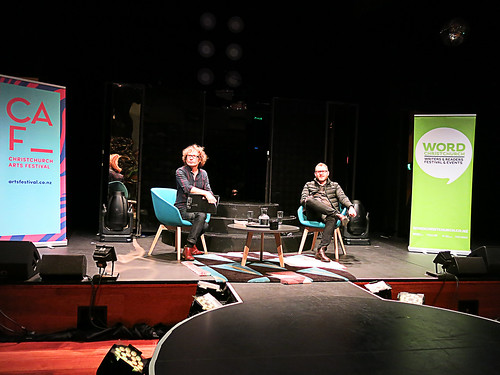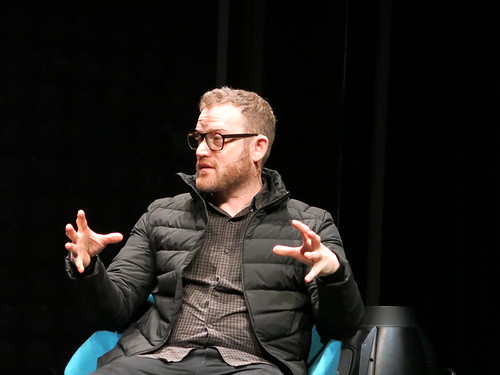The appearance of Mr John Safran in Christchurch managed to pack out The Piano venue on Sunday with a fair audience. He was matched with NZ's very own version of himself, Te Radar Esq., who pointed out that although they both looked very similar, you could easily tell them apart as John was the one with the accent. Unless of course you were from Australia, in which case Te Radar was the one with the accent. Simple really.

Yet simple John's new book Depends What You Mean by Extremist: Going Rogue With Australian Deplorables is not. In fact it might be claimed that one reason for writing the book was because most other media didn't like the tangled web of stories John had discovered in his very own Aussie backyard. What he'd found happening in the world of political radicals was not easily reduced by the popular media spotlight to black vs white, or local vs outsiders.
There are many reasons people are in involved in anti-Islam rallies, and it's not always politics.
In the world of Australian extremist groups things have become very complicated, says John. "Out in the street things are so messed up, it's hard to pick things apart."
John has found a very diverse range of cultures and people marching for the reclaim Australia and anti-Islam causes, some of them strange and unexpected bedfellows. An anti-immigrant campaigner with Aboriginal and Italian lineage hanging with white nationalists, a Sri Lankan pastor opposing multiculturalism, and leaders of anti-immigrant rallies opening their speeches by acknowledging the land they were standing on as belonging to the Aboriginal community.
Some have claimed the lack of media interest in John's stories proves the "bubble" caused by social media and the internet is real, the so-called echo chamber where we only pay attention to things and ideas that meet our world-view and beliefs.
Yet people have always filtered news and read newspapers and magazines selectively. We read what attracts our interest and reading things that don't fit our understanding of the world can be challenging, so often we don't. The internet hasn't created that effect, it's just made it quicker and easier to achieve – such is the way of computers.
What John has discovered is that thanks to social media on the internet, the "unsayable often becomes normal when repeated over and over":
The world changed as I was writing the book. The anti-Islam street movement tried to portray the rallies as 'normal' not extreme, but I found they were led by some very extreme people. It was like the fringe and alternative had become mainstream or at least mingled up with the mainstream.

Te Radar asked John if he'd become less optimistic about the world as a result of writing the book? John's response was that he had definitely got a bit paranoid hanging around with extreme people. Ironically he thought that getting out on the streets got him out of the echo chamber that the average person might inhabit.
But the idea that he may be humanising these people by writing about them in a book was not something he was trying to achieve. He is more driven by the comedian and artist in him, not so much the need to be a writer:
I can't moralise about anything 'cos I've always done something in the past I shouldn't. But I don't think people read my book and think the things these groups are saying and doing are ok.
A few questions from the audience stirred things up, with a bit of heckling that just came across as try-hard or even embarrassing. Mostly it was all very civilised and well-behaved. I don't go to a lot of these events, so maybe that's normal in Christchurch.
I've enjoyed reading the book and it's definitely an eye opener. And thanks to John seeing the irony in much of what he saw happening, very funny too, although perhaps more in a gallows humour way.
John Safran's ability to just rock up somewhere Louis Theroux styles and ask people the questions going begging, without being beaten to a pulp, continues to amaze me. An audience member shared the story of the New York commuters cleaning anti-Semitic graffiti from the walls of a train with hand sanitser, and John himself thought that the antidote to all this extremism is just to expose these people to the world.
All of which made me think that maybe John Safran is using humour to wake us up to the way people under our very noses think about the world. Does this make him the comedic hand sanitizer of the Aussie extremist world?



Add a comment to: Strange relationships – John Safran meets Te Radar: WORD Christchurch Shifting Points of View